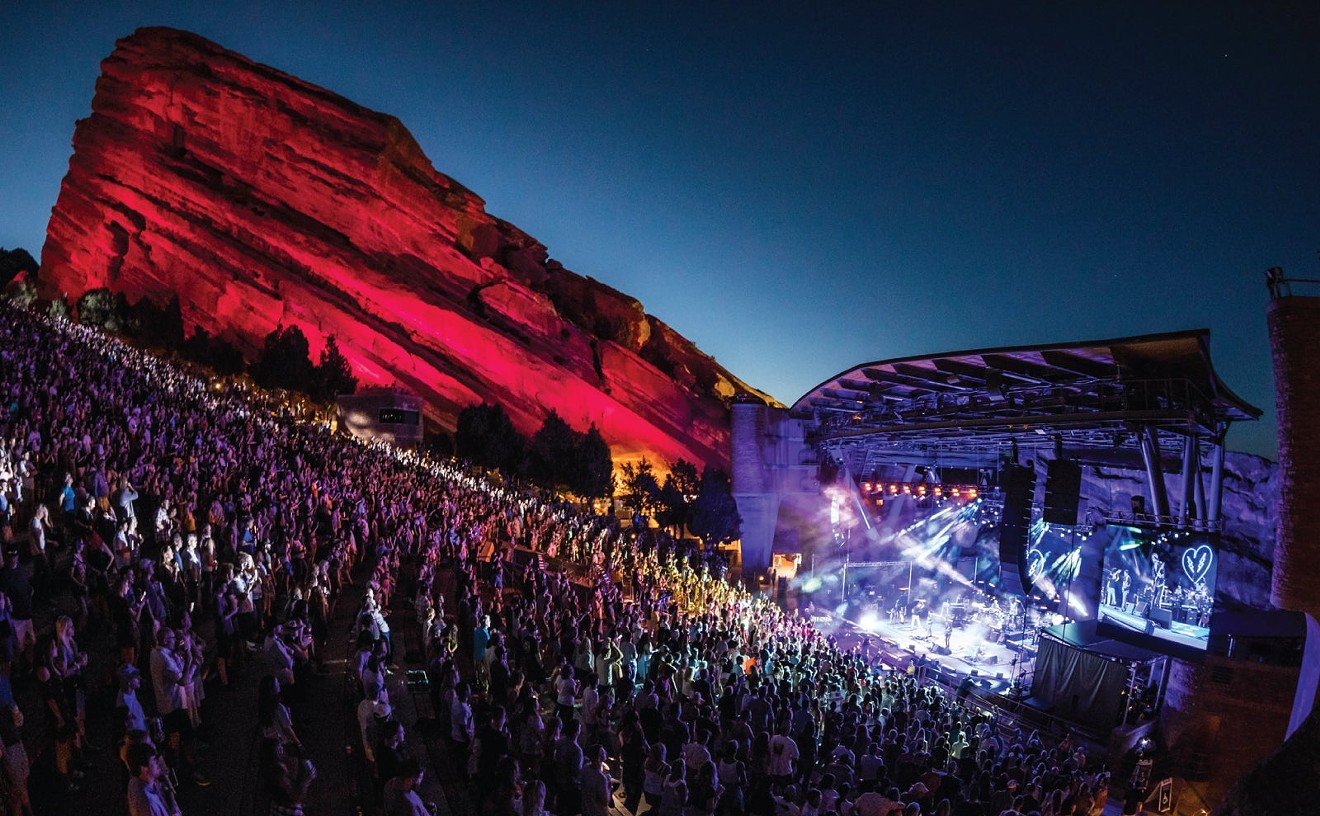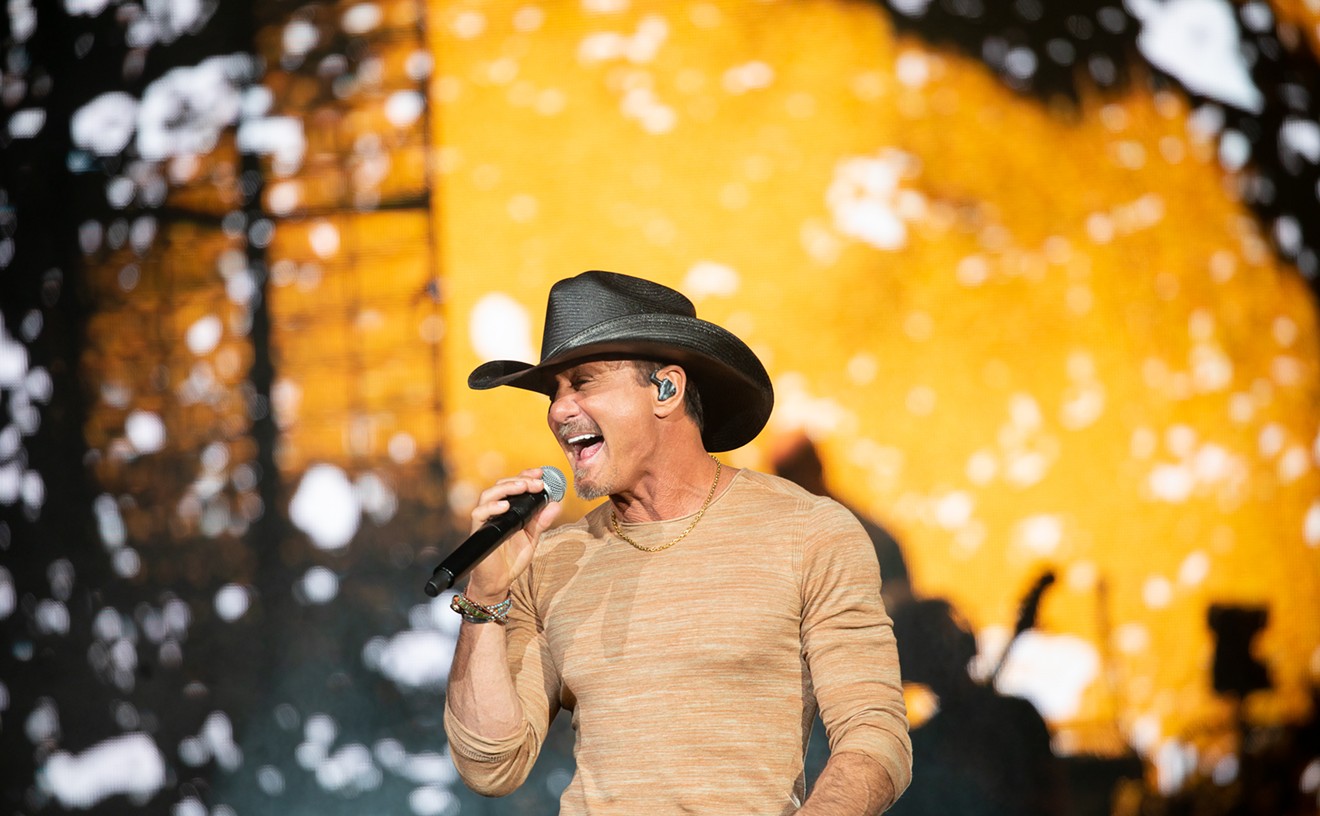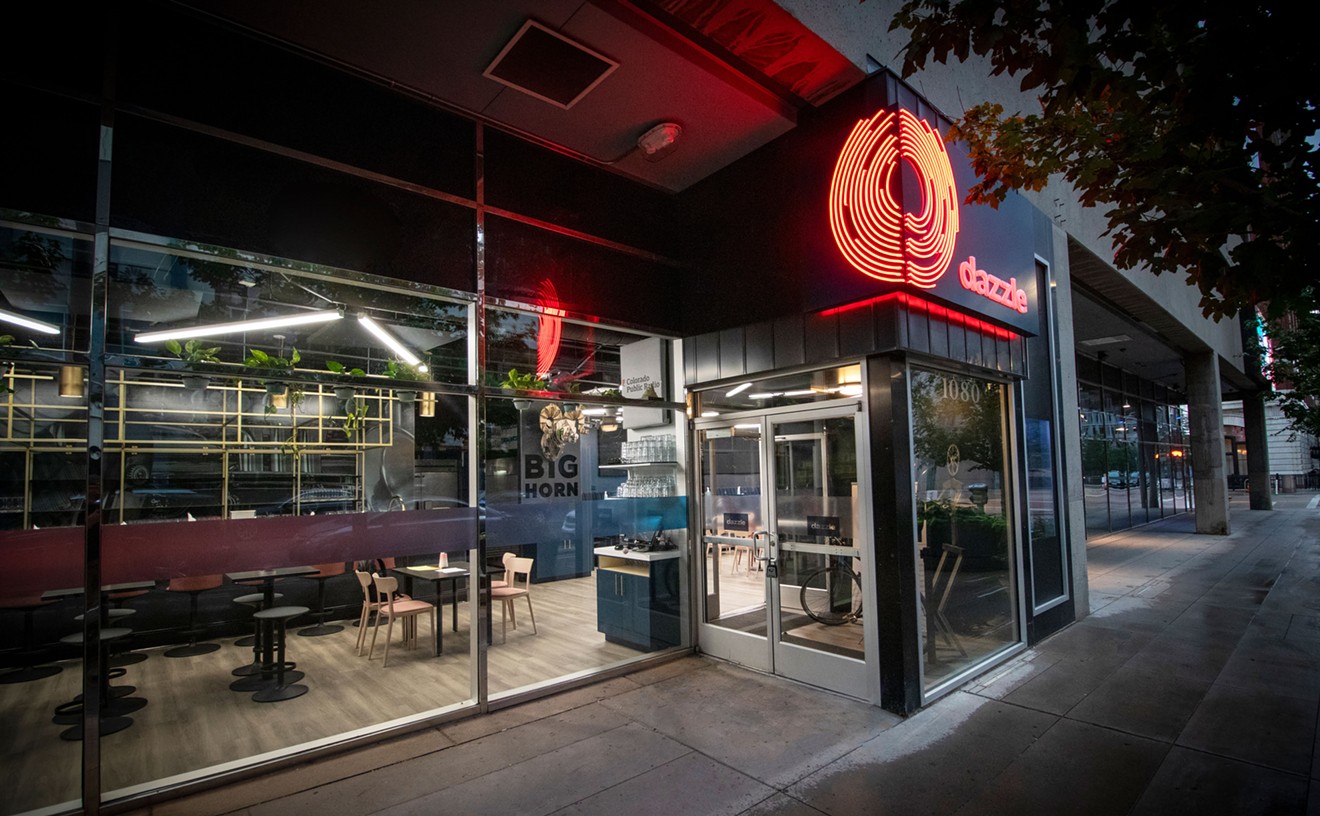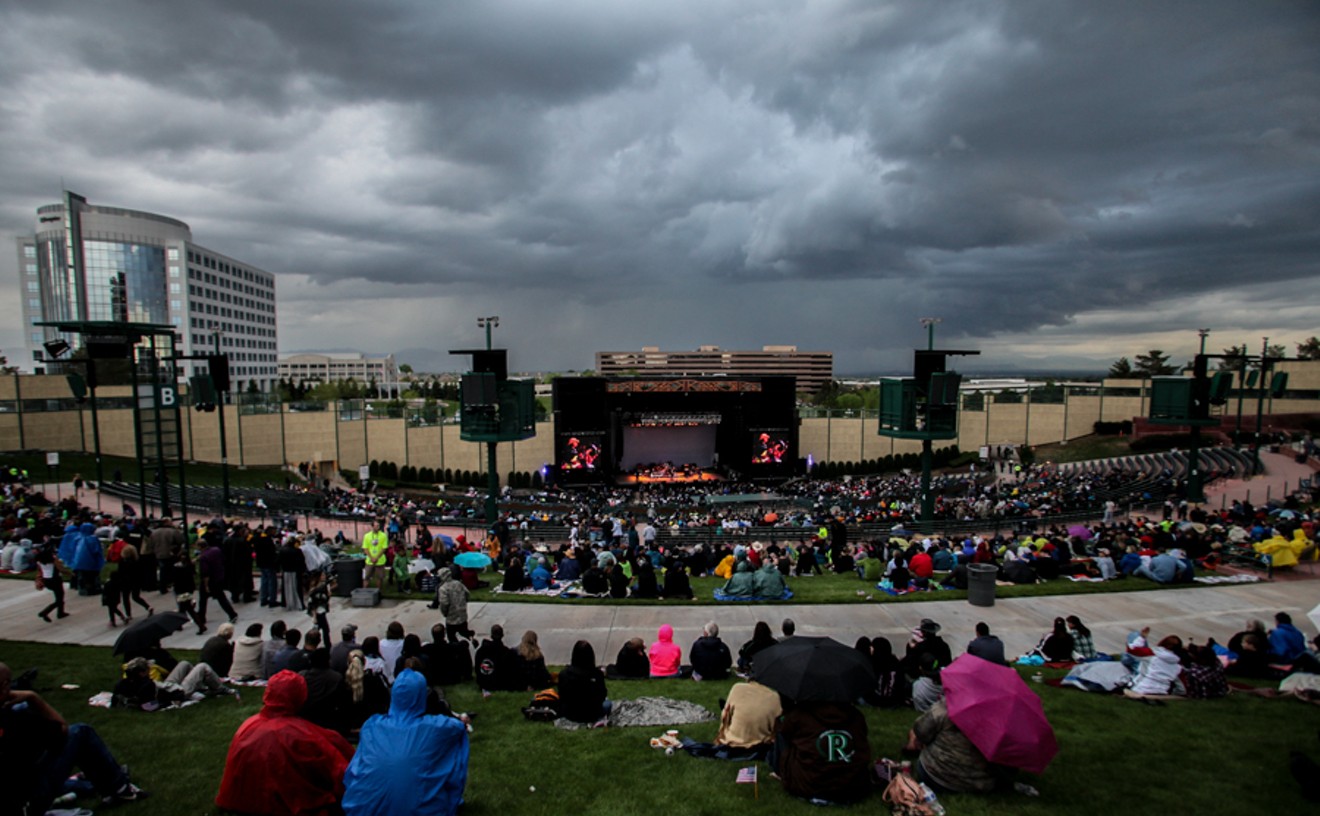Johnny Marr is an iconic and influential guitarist best known for his work in the Smiths, which broke up in 1987. His guitar phrases and his genius for crafting textured and tonally rich rhythmic leads has influenced countless rock guitarists of the last quarter-century. Since leaving the Smiths, Marr hasn't exactly been idle or resting on his laurels.
See also: - Sunday: Johnny Marr at the Gothic Theatre, 4/21/13 - The Smiths '80s radio-station takeover: What really happened according police reports - More than a fascinating piece of Smithsology, the '80s radio takeover is a story of redemption
Marr, once a member of Electronic with Bernard Sumner of New Order and Neil Tennant of Pet Shop Boys, has played on a number of records and contributed to numerous other high-profile projects, including his recent stint in Modest Mouse. This weekend, Marr returns to Denver in support of his debut solo album, The Messenger, and in advance of the show, we spoke with the charming and intelligent guitarist about how he got the sound for "How Soon Is Now?" and his signature model of the Fender Jaguar.
Westword: You got started playing music early in life. How did you become friends with Andy Rourke and Kevin Williams?
Johnny Marr: I'd already played a couple of shows before that with a couple of bands. I'd been in a couple of bands before I met Andy, even though I was fourteen or fifteen at the time. We met in school, Andy and I. I'd been playing in these little kid's kinds of bands at twelve and thirteen. When I got to fourteen and fifteen, I got invited to play in a couple of bands with much older guys.
There was a band in Manchester called Sister Ray, who were just this scary bunch of men/reprobates. I guess word had got around that I had a knack and was a useful little guy to have around, and you only have to buy me some Coca-Cola and I was good to go. So I played with them. I started playing my first sort of shows in front of real [crowds] when I was fourteen.
What got you excited to play music of your own that early on?
The truth is that I've never known what it's like to not want to play music of my own because I come from an Irish family that all played instruments. Luckily for me, my parents were very young when I was born -- they were like sixteen, seventeen -- and they were from a tradition of people playing instruments, accordions, pennywhistles, guitars, harmonicas and things like that -- cheap little instruments. But because they were young and moved over to Manchester, they liked rock and roll and pop music of the day.
The culture of staying up late and having some drinks any and every night of the week was what I grew up around. But it was also twinned with a kind of mountain vibe because they were young and happy to have gotten away from the farmlands. So they were really into pop music. So the two things kind of came together, this assumption that you played or sang.
I started playing harmonica when I was a little boy. I used to get pushed out to entertain adults at two o'clock in the morning. I also had a kind of obsession about the guitar. The first actual toy that I had that I loved was a little wooden guitar that my folks brought me from a shop that sold brooms and buckets and stuff like that. I used to carry that guitar around like my friends would carry a football. I took this thing with me everywhere.
In all honesty, it's never been in my mind to not play an instrument in front of people. A bunch of things sped me along in my life to doing it for a living. I moved from the inner city to the suburbs, where there coincidentally happened to be a bunch of kids my own age or a little older who took themselves very seriously as guitar players.
And very quickly after that, the punk explosion happened to these older friends of mine. So I was watching all of this very closely. I guess there was some part in the personality as well that was artistic, and also a desperation to get out of my own economic and social situation -- so a whole load of things went into getting me where I am now.
You started playing guitar before there were a lot pedals around to process sounds. Do you feel that helped you in some ways develop your own style rather than having to rely on those options for a signature sound?
Absolutely. Whatever bit of advice and guidance I could get from anywhere -- whether that was rare books of interviews with Chet Atkins, or I remember John Lennon talking about being a rhythm guitar player and how important that was -- all of these little snippets of wisdom and information I just took on board.
I remember some guitar player saying it was better to learn on acoustic and that that would make me better. That was advice I took and I've always given when I've been asked. I was aware at the time that if I got good on acoustic that electric wouldn't be a problem, but that that's not necessarily the case the other way around.
I started out doing pretty much what I do now on an acoustic and transferred it to electric when I was able to get a paper route and buy a crappy red electric guitar. I knew the value of working stripped down and I still do, although in this day and age I've made a lot of records with different sounds. I must say I really love what technology can afford you.
I kind of think what I do is like producing with my feet because I do a lot of that in my own shows. Particularly when I'm playing guitar with other bands, I'm always changing reverb [settings] and modulation types and the very sorts of things that [maybe no one else realizes what's going on], but it keeps me interested. I think because I come from a time before that was possible, it's a magical thing for me.
I think I understand the value of not being tied to those things so your own technique can flourish -- not relying on anything, really. I think that it's cool to keep an eye on your purism sometimes. I'm glad I can pick up an acoustic guitar, and if it's not sounding too good, I just put it into a tuning until it does. I also have an appreciation for the almost novelty factor of being able to hit a couple of switches and go from one amp sound to another.
That rippling effect, layered effect and maybe tremolo effect you had on "How Soon Is Now" -- did you do that with multiple amps when you recorded it?
Yeah. The tremolo sound from the intro? That was four Fender Twin Reverbs. Myself controlling the speed of two of them and the producer controlling the speed of the other two. So two amps were recorded on one side of the stereo and the other two on the other side. I recorded the part on the tape without the tremolo, and then I sent the part from tape out to four amps, and he controlled two, and I controlled the other two.
And it took a long time because inevitably the tremolo would go out of time with the track because the tremolo doesn't stay in regular clock time. Also we would go out with each other's amps, so we had to keep looking up at each other after every fifteen second bursts and kind of fess up, "Oh yeah, mine kind of went out of time." It took long time, but I'm glad we did it that way because if we had cut and pasted two seconds of audio, it wouldn't have had the same dynamic quality throughout the six minutes of the song, or however long it is.
When you did that live, did you have to do it a different way, or did you have to strip it down?
When I was first touring it in '85 and '86, it was a difficult thing to do even with two guitar players. But now the band plays it very well, and I've learned over the years how to play it and how we make it work. I think of it like a boat riding through the sea, really. I have found a way that I can steer it.
The slide part on that track was quite difficult to simulate, but again, the guy I have playing in my band, that I've been playing with for a while, can do it, and he and my son are the only two guys I know that play it right. Recently, I had Ronnie Wood playing with me, and he did a good job with it. I think if you have your head on it, it can be done.
You recently released your debut solo album. What do you feel you were able to do with this album that you haven't been able to with your many and varied other projects?
I think singing with confidence without too much doubt was a satisfying thing. It was, artistically, very satisfying to be covering subject matter that means something to me. I think a little bit of that was getting to know yourself. And just the simple fact that I was ready to do it now. Everything else I'd done since going out on my own in '87 has been absolutely amazing to me, and I feel like the luckiest guitar player alive, and I am very grateful.
I've been asked why it took so long to make this record. Well, it didn't really take too long to make this record. It took six months to make it. What I'd been doing before that was hopefully a journey I can continue. I guess what we play is still indie or alternative, I don't know all the different terms these days -- I've kind of lost track about what label I'm supposed to be these days. But it's still the kind of music I started playing when I was a kid, really. I'm fronting a band I could have fronted at fifteen or sixteen, so that's quite cool.
Do you mostly play Jaguars these days?
I pretty much exclusively play a Jaguar. That's because I got to design it. So I'm kind of in trouble if I didn't get it right. The guitar that I designed took me a few years to do it and a few years of obsession and driving people around and nuts. I kind of get that way about things. Fender approached me about putting it out -- a signature model.
That was a great honor, and it turned out really well. I haven't met anyone who doesn't like it. Fender was really cool to work with. They just helped me out in whichever way I needed it. If someone gave me a lot of time to figure out how to make it better, I wouldn't know how to make it better.
What is it about that style of guitar that you appreciate?
I knew what it is that I need to do. The friend who worked on it with me said when we were finished, "Oh right, it sounds like all your records all put together." I guess that got the job down. Without getting too technical about it or elitist, it kind of does the job of a Gretsch, sonically, and a Rickenbacker, sonically, but I play it like a Fender. It's kind of handy, really. I used to it pretty much exclusively during my time with Modest Mouse. And totally exclusively during my time with the Cribs. I've used it nearly entirely on the new solo record.
Follow @Westword_Music











